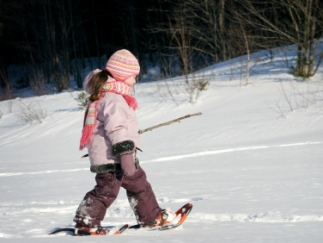When I was a child our family often took day trips to Walden Pond in Concord, Massachusetts, where we would swim, hike, canoe and kayak, and would see Thoreau's famous quote posted on a large sign near the cabin where he lived from 1845 to 1846. I recall how the notion of Thoreau's independence, self-reliance and simplicity resonated with me. The romanticism of living in the woods meant being grounded in one's surroundings, and appreciating the outdoors. Being physical was related to survival, sustenance and sheer enjoyment in nature.
Fast forward to 2009 when my oldest son was in kindergarten. The director of after-school clubs at his school asked me if I was interested in developing a curriculum that was non-competitive, and would keep kids physically active during a Northeast winter. I began my research by asking two questions: First, on a physical level, could I make the program exciting and engaging enough for the children to want to be active outside in the cold instead of playing organized sports? Second, on a psychological level, could we build strengths and virtues that would enable individuals and communities to thrive? (A question embodied in the definition of positive psychology)
My objective was to have the students be physically active in a cooperative environment in which they would develop personality traits that define the positive psychology literature: teamwork, moderation, communication, leadership skills, tolerance, courage, compassion, conflict resolution, integrity and resilience. Admittedly, a tall order.
Our Outdoor Adventure Club (OAC) met weekly for six weeks over the course of a cold and snowy winter. Cognitively the "catch" was how to survive if a student somehow ended up alone in the wilderness. Could they survive the night in cold conditions? Physically the "catch" was that the chances of survival improved if the student was physically strong.

That first year was a learning experience on how much cold the younger members could tolerate and what piqued their interest the most.
I am happy to say that we are now in our third year and the club hit our maximum number of participants and we had to create a waiting-list for eager students to join OAC.
Sample curriculum
Interested in helping to start an OAC where you live? Here is an outline of our curriculum to help get you started. Each session is one hour in length.
Session 1: Understand how to use day-pack essentials (provided for each participant) for survival.
Session 2: Learn how to build a shelter to survive the night.
Session 3: Trail running with geo-cache which includes a stream crossing.
Session 4: Obstacle course. Be prepared to get muddy!
Session 5: Bicycle skills session. Bring your bicycle and helmet!
Session 6: Final session/geo-caching, build a fire & roast marshmallows for s'mores and fresh fruit.
Benefits of OAC
There were three main benefits to the students from participating:
First, OAC students were free of the mindset of fear and failure that otherwise would have made them apprehensive about taking risks, trying new sports or pushing beyond their comfort zone. They embraced this "free-it-up and let-yourself go" attitude because they were process-oriented; there was no outcome (such as winning the game) to be judged or evaluated, either by themselves or others. It was clear that they let go of self-judgment, and they were open in each session to trying new activities like geo-caching in the outdoor environment.
Second, the students in OAC learned how to strive for excellence, not perfectionism, since the tasks were timed and related to survival. They would approach a task with complete focus and a deep sense of engagement. They were doing their best and they were not holding on to the idea of the unattainable expectation of perfection.
Third, Outdoor Adventure Club naturally placed the student in the here and now. Having a present mind-set made it easier not to over-analyze past hurdles or obstacles. Concentrating on how good it feels to be exploring or participating in a new activity makes it easy to enjoy the process and feel of being outside. The more the students were able to focus on the present, the more likely they were able to embrace the free-it-up and let-yourself-go attitude for continued success.
All in all, involving your children in physical activities outside of organized sports can reap enormous benefits. When you find an activity that involves learning practical skills and teaching children how to have more confidence, it's a win-win for everyone.
K.C. Wilder, Ph.D., is a former college cycling All-American, two-time national masters short track cycling champion, and professional cyclist, certified sports trainer and sports psychologist. She lives in Bucks County, Pennsylvania with her husband, two sons and yellow lab. For more information about Dr. Wilder, click here.








